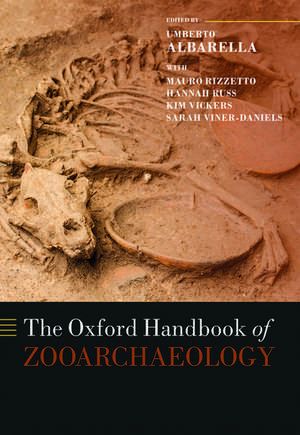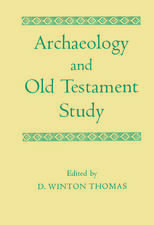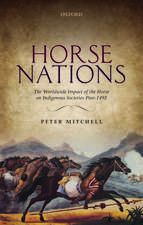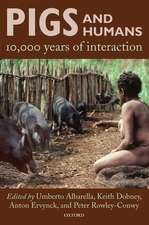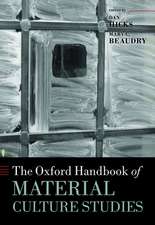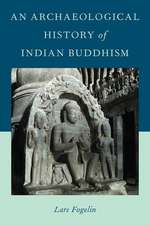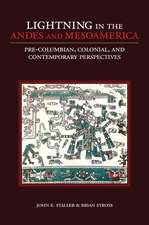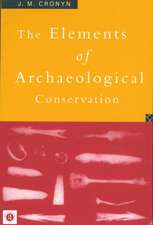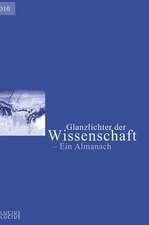The Oxford Handbook of Zooarchaeology: Oxford Handbooks
Editat de Umberto Albarella, Mauro Rizzetto, Hannah Russ, Kim Vickers, Sarah Viner-Danielsen Limba Engleză Hardback – 23 mar 2017
| Toate formatele și edițiile | Preț | Express |
|---|---|---|
| Paperback (1) | 318.00 lei 31-37 zile | +120.04 lei 7-11 zile |
| OUP OXFORD – 23 iul 2020 | 318.00 lei 31-37 zile | +120.04 lei 7-11 zile |
| Hardback (1) | 915.02 lei 31-37 zile | |
| OUP OXFORD – 23 mar 2017 | 915.02 lei 31-37 zile |
Din seria Oxford Handbooks
-
 Preț: 236.89 lei
Preț: 236.89 lei - 8%
 Preț: 358.80 lei
Preț: 358.80 lei - 17%
 Preț: 912.51 lei
Preț: 912.51 lei - 12%
 Preț: 307.94 lei
Preț: 307.94 lei - 25%
 Preț: 829.05 lei
Preț: 829.05 lei - 14%
 Preț: 987.01 lei
Preț: 987.01 lei - 26%
 Preț: 1376.97 lei
Preț: 1376.97 lei - 29%
 Preț: 929.22 lei
Preț: 929.22 lei -
 Preț: 303.54 lei
Preț: 303.54 lei - 26%
 Preț: 343.85 lei
Preț: 343.85 lei - 14%
 Preț: 278.15 lei
Preț: 278.15 lei - 29%
 Preț: 930.94 lei
Preț: 930.94 lei - 30%
 Preț: 1065.79 lei
Preț: 1065.79 lei - 15%
 Preț: 357.85 lei
Preț: 357.85 lei -
 Preț: 263.45 lei
Preț: 263.45 lei - 23%
 Preț: 839.81 lei
Preț: 839.81 lei - 16%
 Preț: 264.39 lei
Preț: 264.39 lei - 33%
 Preț: 737.68 lei
Preț: 737.68 lei - 33%
 Preț: 725.45 lei
Preț: 725.45 lei - 26%
 Preț: 342.76 lei
Preț: 342.76 lei - 25%
 Preț: 366.95 lei
Preț: 366.95 lei - 13%
 Preț: 304.72 lei
Preț: 304.72 lei - 16%
 Preț: 263.35 lei
Preț: 263.35 lei - 12%
 Preț: 267.23 lei
Preț: 267.23 lei - 33%
 Preț: 815.51 lei
Preț: 815.51 lei - 6%
 Preț: 346.76 lei
Preț: 346.76 lei - 22%
 Preț: 1095.69 lei
Preț: 1095.69 lei - 29%
 Preț: 931.18 lei
Preț: 931.18 lei - 29%
 Preț: 942.77 lei
Preț: 942.77 lei - 24%
 Preț: 1071.82 lei
Preț: 1071.82 lei - 23%
 Preț: 1052.07 lei
Preț: 1052.07 lei - 21%
 Preț: 863.03 lei
Preț: 863.03 lei - 30%
 Preț: 815.25 lei
Preț: 815.25 lei - 29%
 Preț: 855.42 lei
Preț: 855.42 lei - 30%
 Preț: 842.04 lei
Preț: 842.04 lei - 11%
 Preț: 258.32 lei
Preț: 258.32 lei - 29%
 Preț: 859.51 lei
Preț: 859.51 lei - 29%
 Preț: 1083.61 lei
Preț: 1083.61 lei - 15%
 Preț: 273.41 lei
Preț: 273.41 lei - 30%
 Preț: 818.12 lei
Preț: 818.12 lei - 11%
 Preț: 365.23 lei
Preț: 365.23 lei - 21%
 Preț: 359.87 lei
Preț: 359.87 lei - 13%
 Preț: 264.87 lei
Preț: 264.87 lei - 9%
 Preț: 307.08 lei
Preț: 307.08 lei - 28%
 Preț: 845.79 lei
Preț: 845.79 lei - 23%
 Preț: 855.11 lei
Preț: 855.11 lei - 21%
 Preț: 861.04 lei
Preț: 861.04 lei - 12%
 Preț: 250.34 lei
Preț: 250.34 lei
Preț: 915.02 lei
Preț vechi: 1098.94 lei
-17% Nou
Puncte Express: 1373
Preț estimativ în valută:
175.08€ • 182.82$ • 144.58£
175.08€ • 182.82$ • 144.58£
Carte tipărită la comandă
Livrare economică 04-10 aprilie
Preluare comenzi: 021 569.72.76
Specificații
ISBN-13: 9780199686476
ISBN-10: 0199686475
Pagini: 866
Ilustrații: 129 black-and-white illustrations
Dimensiuni: 186 x 253 x 51 mm
Greutate: 1.87 kg
Editura: OUP OXFORD
Colecția OUP Oxford
Seria Oxford Handbooks
Locul publicării:Oxford, United Kingdom
ISBN-10: 0199686475
Pagini: 866
Ilustrații: 129 black-and-white illustrations
Dimensiuni: 186 x 253 x 51 mm
Greutate: 1.87 kg
Editura: OUP OXFORD
Colecția OUP Oxford
Seria Oxford Handbooks
Locul publicării:Oxford, United Kingdom
Recenzii
This book is another manifestation of and for the global community of zooarchaeology.
The book is an assertion of the importance of zooarchaeology...It should be on the shelves of not just 'bone buffs', but of archaeologists across the discipline.
Together, the volume's eight African chapters give a varied and well-referenced overview of archaeozoology as practised in diverse regions of the continent...
The book's historical and geographical range is remarkable from interrelationships between humans and mammals in Siberia to prehistoric fauna in New Zealand...And you dont need a degree in anatomy or archaeology: the book is accessible and focuses on concepts and themes (rather than anatomical minutiae),supported by extensive references that allow you to take matters further.
The book is an assertion of the importance of zooarchaeology...It should be on the shelves of not just 'bone buffs', but of archaeologists across the discipline.
Together, the volume's eight African chapters give a varied and well-referenced overview of archaeozoology as practised in diverse regions of the continent...
The book's historical and geographical range is remarkable from interrelationships between humans and mammals in Siberia to prehistoric fauna in New Zealand...And you dont need a degree in anatomy or archaeology: the book is accessible and focuses on concepts and themes (rather than anatomical minutiae),supported by extensive references that allow you to take matters further.
Notă biografică
Umberto Albarella is a Reader in Zooarchaeology at the University of Sheffield. He obtained his PhD from the University of Durham, having first become interested in anthropology and then archaeology as an undergraduate student, and worked at the Universities of Lecce, Birmingham, and Durham before moving to the University of Sheffield in 2004. Specializing in the study of animal bones from archaeological sites, his main areas of research are wide-ranging and include animal domestication and husbandry intensification, ethnoarchaeology, the ritual use of animals, husbandry evidence of Romanization, animals and medieval life, integration in archaeology, and archaeology and politics. He is widely published in these fields and has previously served as Secretary of the International Council of Archaeozoology (ICAZ) from 2006 until 2012.Mauro Rizzetto is a PhD student at the University of Sheffield whose research concerns the development of animal husbandry during the late Roman to early medieval transition in Britain and the lower Rhine region, with particular regard to biometrical changes. He has also been working at a number of archaeological sites in Italy, Britain, France, Greece, and Spain, dating from the Neolithic to the post-medieval period. He previously obtained an undergraduate degree in Archaeological Science in 2013 and a Master's degree in Osteoarchaeology in 2015, both at the University of Sheffield. Hannah Russ is a Post-Excavation Manager at Northern Archaeological Associates and an Honorary Research fellow at the Universities of Sheffield and Wales, Trinity Saint David. She is a zooarchaeologist specializing in the study of aquatic animals, including fish, molluscs, and crustaceans, and has worked on remains from five UNESCO World Heritage sites, as well as other sites in Western Europe and the Middle East dating from the Upper Palaeolithic through to the post-medieval period. Hannah completed her PhD in Archaeological Sciences in 2011 at the University of Bradford and subsequently held positions at the University of Sheffield and Oxford Brookes University before taking up her current role at Northern Archaeological Associates.Kim Vickers is an Honorary Research Fellow in the Department of Archaeology at the University of Sheffield and specializes in zooarchaeology and the reconstruction of ancient environments. After completing her PhD on the palaeoentomology of the North Atlantic islands in 2007, her research has focused on the environmental impact of medieval human settlement and activity in Iceland, Greenland, and the Faroe islands, and on the nature of resource use and contact between Norse and Inuit cultures in Greenland, while her other research interests include the Iron Age to Roman transition in Britain and the effects of the Roman invasion of Britain on farming practices and animal husbandry in the early first millennium AD.Sarah Viner-Daniels is an Honorary Research Fellow at the University of Sheffield. After completing her PhD at Sheffield she was subsequently appointed as a Research Associate to the Feeding Stonehenge project. Her main areas of interest include animal exploitation in Mesolithic and Neolithic Britain and the application of isotopic analysis (using strontium and oxygen) to the understanding of prehistoric livestock mobility.
